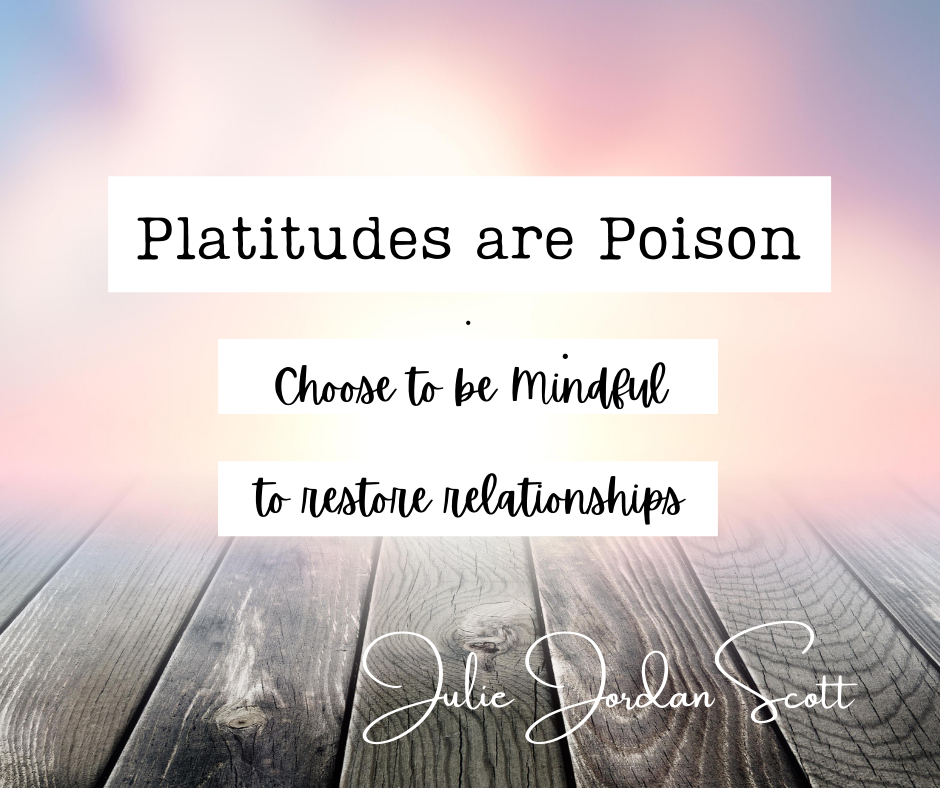
Humans who love one another, on the whole, want to be helpful. They want to do their best. One of my oft-used phrases my children have been known to repeat is “No one wakes up plotting ways to make other people mad.”
Granted, some people do, but the majority of people do not wake up as sinister characters in mediocre books and movies.
What are platitudes?
Platitudes are throw-away phrases that are used because people are more comfortable saying something than not saying something, especially when they are in a conversation where people are being vulnerable.
Platitudes are not always wrong to use. Think of it like nutrition: we won’t expect to stay healthy and strong if our diet is 100% donuts. Sure, they may make us feel better for a short burst of time – and donuts can also become harmful when consumed too often and replace more healthy choices.
Here are some examples:
“Everything happens for a reason.”
”Good things come to those who wait.”
“Whatever will be, will be.”
Platitudes are not always bad: especially when not overused
Sometimes we say platitudes to ourselves and they serve as a bridge from feeling horrible to feeling more able to get to our next task or next conversation. This is a positive use of platitudes (and remember choosing between chocolate raised or a cruller six times a day will not make you a healthier person.
The reasons we ought to be mindful of using platitudes are many, and it is especially important when we have loved ones who are grieving, hurt or recovering from illness or trauma.
Questions to consider before speaking in a cliched “tried and true” statement to a hurting person
- If I say this phrase, do I run the risk of shutting down the conversation with my loved one? Will this help or harm the healing process?
- Am I saying this to make myself feel better or am I saying this because I am uncomfortable being silent?
- Your mother may have given the admonishment mine did: “Think before you speak.” which may be considered a platitude, also. In fact, I heard my sister get lectured about this so many times I started thinking too much about thinking so my voice and thoughts most often went unspoken and lead to many years of therapy and healing work.
This platitude did lead to an acronym to consider before you blurt another phrase:
Easy check in to discern whether to speak or wait or say somethign different:
- Is this true? Think factual rather than a big T truth.
- Is this helpful? Can any action be taken from what you say? Will the person feel better or worse having heard what you say?
- Is this inspiring? Will it build the person up or tear them down.
- Is this necessary to say? Or is it empty fluffy “donut talk”
- Is this kind? Is it compassionate and offered with love? Will the result of speaking this make your loved one feel more loved or will they feel defensive and dishonored or someplace in between?
When people are struggling, the last thing they want is to feel judged, shamed or surrounded by people who don’t want to listen and don’t seem to care about them.
Instead of platitudes, speak with your heart
Using platitudes may cause irreparable harm. Share from your heart, authentically, instead. with your heard. Being more and meaningfully may cause irreparable harm to your most important relationships. You may be well-meaning when you use platitudes, but unfortunately, this may not land well.
Options to use in uncomfortable conversations instead of platitudes:
I am not sure what to say right now.. I want to help you feel better because I care about you. I am afraid to say something stupid that I may regret saying.
Would you like some advice or would you like me to listen more?
I’m here for you: keep saying whatever you need to say. I am listening.
This must be difficult for you to talk about – because I love you so much my knee jerk response is to rush in and make it all better. I am doing my best to not do that anymore. I apologize in advance if and when I do that.
The less you rely on platitudes, the better communicator you will become, the more comfortable you will be with uncomfortable conversations and the more meaningful your relationships will be.
Below: a 5 minute video on this topic that may be helpful to watch and share with people:
Julie JordanScott is a multipassionate creative who delights in inviting others into their own fullhearted. artistic experience via her creativity coaching individually or in groups, courses and workshops. To receive inspiring content and videos weekly and find out more about Coaching, Courses, Challenges and what’s going on in the Creative Life Midwife world? Subscribe here:

This is excellent, Julie. We all need to be reminded of what we’re saying to a hurting person is helpful or harmful. The thing is, what’s helpful to one can be harmful to another. That’s why it’s best to listen and empathize. Many times it’s our presence that means the most, not our words.
I’m glad this post was published. You have no idea how it will help those who read it.
Blessings,
Debi 🍁🍃🍂
This brings tears to my eyes. I have learned to ask permission before speaking, too. Hugs to all who read.
I despise cliches and platitudes. I will bookmark and share this when necessary. THANK YOU.
Thank you, Carol. I am going to add a video I just made as some people might benefit from that, as well. Hearing sometimes gets to some people when reading won’t.
I’m glad it was helpful to you. I literally cringe at cliches, even when I recognize people mean well. When I re-read this post I saw it wasn’t nearly as angry and lecture-y as I thought it might be. 🙂
Thanks for sharing and the reminder to listen more.
So true! Although I do use “everything happens for a reason,” it’s more to let myself know that we have to go through the bad stuff too. Listening is a skill. Thanks for sharing some good ideas about what to say.
Yes: the self use of platitudes can be helpful – when done in moderation and used almost as mantra-like. By the way, great self recognition!
It’s bad enough when platitudes are prosaic, but too often they are meaningless. Great advice.
I love your examination of platitudes because they are useless so often. I also love your suggestions instead. Very thoughtful blog.
Thank you so much for your thoughtful comment!
This is such great advice! I remember when my mom died, people would ask how old she was, and when I told them, a lot would say, “oh, well she lived a good, long life,” and their tone of voice reprimanded me for complaining. Or, I would tell them what kind of cancer she had, and they’d say, “oh, did she smoke?” Yes, she did smoke, but the underlying message – “oh. She must have smoked. So that’s really why she died. It was her fault.” – pissed me off!! And was inappropriate, I believe, since I was obviously grieving. I wish they had watched your video before talking to me.
I am growling over here. People are so thoughtless sometimes. I have worked with many families who have lost babies due to sudden infant death and people will ask questions as if they believe there must be a root in “bad” parenting. One of the first rules of helping people who are grieving is… to not even think about blame or figuring it out for yourself… argh.
What great advice! I like to think before speaking to make sure what I’m going to say will not hurt anyone. I like you ending, speak with your heart.